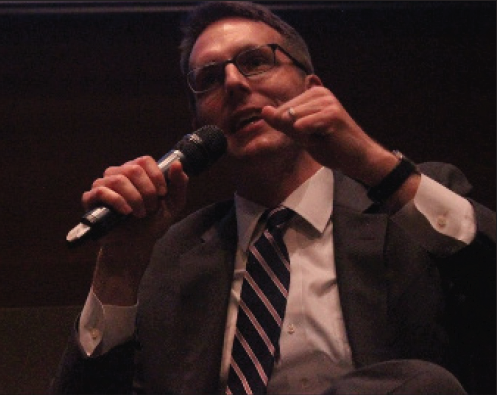News media is evolving to the digital front, and the power of journalism is still an important factor when holding politicians accountable for their actions and informing people on issues that matter.
On Feb. 19, Winthrop hosted the most recent installment of The News Literacy and the Future of Journalism series,“The State of the Fourth Estate,” invited the citizens of Rock Hill and students of Winthrop University. The event featured Pulitzer Prize winning journalist David Fahrenthold from The Washington Post. He spoke about the nature of news framing and the future of journalism in this day and age.
“I’m optimistic about the future of journalism,” Fahrenthold said. “We have lots of problems but we still produce something that people want.”
One of the first points Fahrenthold discussed was the changes the Internet brought toward newspapers, with sites like Craigslist and Google taking away classified ads and providing quick news. He remembered how this brought an end to the news monopoly newspapers had for years.
“We thought our business was immune to change, that we didn’t have to change. We thought we were joining some that was important but we weren’t ready for it,” Fahrenthold said.
Another key point that the speaker made was how the 2016 election cycle. President Donald Trump’s campaign tactics had caught news outlets off-guard with his scandalous comments and actions provided a variety of news stories.
“Both us and The New York Times have benefitted from the Trump Presidency,” said
Fahrenthold. “[Trump] could exploit our inability to move quickly on an issue, so it was hard
for readers to follow the thread.”
The key for Fahrenthold to keep his audience in the loop and engaged with the various stories of Donald Trump taking advantage of social media to talk about them is to provide an easy way for readers to be informed.
“I try to give my readers threads to follow in this helter-skelter time and give them time to follow forwards and backwards [in a story],” Fahrenthold said.
Writing stories in threads one after the other allows reporters like Fahrenthold to bring their audience along and help contribute to the news cycle through investigative journalism.
“The most important thing for me is to change how I do investigative journalism. I try to write a little at a time cause writing a little at a time brings in something you were interested in,” Fahrenthold said.
Fahrenthold brought up moments in his career such as a moment where he investigated Trump buying a portrait of himself with his campaign money, which he asked his followers to assist him in finding that portrait through Twitter. His followers in days found where the portrait was. He brought up how the Internet could be useful in engaging with your
followers.
“Social media is both a good thing and a temptation,” Fahrenthold said, “I try to be super earnest in my reporting and trying not to start a fight [with people who comment on my
work].”
The importance of journalism as the Fourth Estate in government is to have power in bringing issues like politics and climate change to light for readers and keep them engaged with the story.
“We have to hold the values of truth and objectivity,” Fahrenthold said. “[You have to] be stubborn, in order to defend our name [of news] and if you see something newsworthy, let us know.”
Fahrenthold helped inspire and entertain the people of Winthrop University and Rock Hill by sharing his message about journalists adapting to the medium of the Internet to aid investigative reporting.
“I hope that the future of journalism is one of people reporting on things that matter,” Fahrenthold said.




